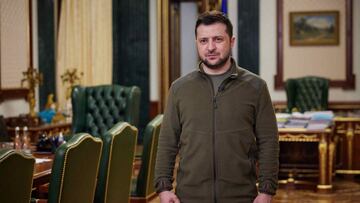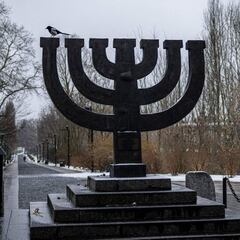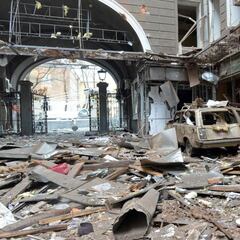Zelenskyy, Zelensky, Zelenskiy: What is the correct way to spell the name of Ukraine's president?
Ukrainian President Volodymyr Zelensky has become a household name. But the spelling of the leaders last name has becomes a serious point of contention.

The spelling of the name of Ukraine's president is likely to be different on every website you read. The BBC and AFP has his name down as 'Zelensky', the Guardian and Reuters have it as 'Zelenskiy', while Sky and Al Jazeera are calling him Zelenskyy. (Here on AS USA we go with Zelenskyy). In Ukrainian it's written: Зеленський. The various spellings of the Ukrainian leader's surname reflect a Ukraine seeking detachment from its past.
“I don’t want Ukraine’s history to be a legend about 300 Spartans. I want peace.”
— CNN (@CNN) March 3, 2022
Ukrainian President Volodymyr Zelensky addresses his country in the face of the Russian invasion. pic.twitter.com/fXZu6igpsr
If you are asking which is the correct, we can turn to a great source: President Zelensky himself. In 2019, Zelensky provided some context to the press, but the confusion gives an insight into the complexity the Ukrainian language, a problem exacerbated by political tensions that have manifested into the war in the country.
So how is the Ukrainian president's name spelt?
Related News
- An attack on Poland or any other NATO member would activate Article 5
- US plans to increase oil production as climate scientists wave red flag
- Elon Musk challenges Putin to a fight on Twitter
According to the man himself: Zelenskyy. But this wasn't always the case.
Confusion stems from how Zelenskyy used to spell his name. He grew up speaking Russian, with the Latin spelling of his name from Russian being 'Zelenskiy.' In fact, it took until December 2018 for him to act in Ukrainian for the first time, everything prior was in Russian.
Zelensky is from east Ukraine and grew up speaking Russian. When he first started his career as an actor and comedian he used his knowledge of Russian to his advantage and gained popularity in the Russian-speaking market.
When the invasion first began, Zelensky made his address in native language calling on the Russian people to oppose the war. This was seen as an extremely compelling move by many in Russia who had seen Zelensky on their televisions for years. During the address he questioned President Putin's motives to "liberate the Donbass" later calling attention to the fact that he was speaking Russian, pleading with the people to understand that while they share a common language, Ukraine is a separate nation.
"These place names, these streets, these families, these events — this is all foreign to you. It’s unfamiliar. This is our land. This is our history. What are you going to fight for? And against whom?" said Zelensky in an attempt to urge the Russian people to oppose the invasion of Ukraine.
While now, Zelensky's knowledge of Russian is seen as an advantage as the conflict continues, the leader's rise to based based on a political break with he old Ukrainian hierarchy of power, one that had strong links to Russia. The two had been united for hundreds of years until 1991. Thus, it would make sense to mark a break with the traditional power structures in Ukraine with a new, ostensibly Ukrainian-spelling English name to show this to the English-speaking world.
What language does Zelensky make his address in?
Typically, the daily addresses Zelensky makes from the streets of Kyiv or from behind a podium are made in Ukrainian. The leader will change to Russian when addresses Russian forces or leaders.
In a recent address, President Zelenksy said to Russian forces fighting in Ukraine “I am giving you a choice. A chance, on behalf of Ukrainians. A chance to live. If you surrender to our forces we will treat you the way people ought to be treated. The way you were not treated in your army."
@ZelenskyyUa speaking to Russian soldiers: “I am giving you a choice. A chance, on behalf of Ukrainians. A chance to live. If you surrender to our forces we will treat you the way people ought to be treated. The way you were not treated in your army” https://t.co/iSJx38gAoM
— Samantha Lock (@Samantha__Lock) March 15, 2022
What other spellings have been questioned since the invasion began?
As alluded to, Ukraine has been trying to make its mark on the world by explaining what it isn't: Russian. Something that has been prominent in the last week of the war is how English language media has also been adapting with the changing view of Ukraine with a key part of this being spelling.
One language switch that readers may have noticed is the change of spelling from 'Kiev' to 'Kyiv', with the former being the Russian language translation of Київ. Other cities have been changed, 'Kharkov' has become 'Kharkiv' as another example.
What these changes in language represent is a fundamental shift in the way Ukraine is portrayed internationally. Far from being a Russian stooge as their Belorussian neighbours are, the English language spellings mark the country as distinctly Ukrainian on the international stage.
Related stories
Many older readers may acknowledge an old way of speaking of the country as 'The Ukraine,' in terms of a Cold War territory, and this slight change further shows the tweaks that have been making Ukraine and its language unique and, perhaps more importantly, distinct from Russian or Soviet ideas of the land.
The war has the eyes of the world's media fixed firmly upon Ukraine. It will be no consolation for a people fighting for survival, but acknowledgment from the world that, finally, Ukraine is not discussed in terms of Russian choosing, will be a source of pride from Ukrainians upon the termination of the war.

